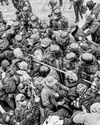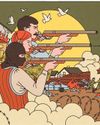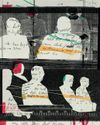
The congressional appearance last month by Nemat Shafik, the president of Columbia University, was a breathtaking “What was she thinking?” episode in the history of academic freedom. It was shocking to hear her negotiating with a member of Congress over disciplining two members of her own faculty, by name, for things they had written or said. The next day, in what appeared to be a signal to Congress, Shafik had more than a hundred students, many from Barnard, arrested by New York City police and booked for trespassing—on their own campus. But Columbia made their presence illegal by summarily suspending the protesters first. If you are a university official, you never want law- enforcement officers on your campus. Faculty particularly don’t like it. They regard the campus as their jurisdiction, and they have complained that the Columbia administration did not consult with them before ordering the arrests. Calling in law enforcement did not work at Berkeley in 1964, at Columbia in 1968, at Harvard in 1969, or at Kent State in 1970.
What’s more alarming than the arrests—after all, the students wanted to be arrested—is the matter of their suspensions. They had their I.D.s invalidated, and they have not been permitted to attend class, an astonishing disregard of the fact that although the students may have violated university policy, they are still students, whom Columbia and Barnard are committed to educating. You can’t educate people who cannot attend classes.
Diese Geschichte stammt aus der May 06, 2024-Ausgabe von The New Yorker.
Starten Sie Ihre 7-tägige kostenlose Testversion von Magzter GOLD, um auf Tausende kuratierte Premium-Storys sowie über 8.000 Zeitschriften und Zeitungen zuzugreifen.
Bereits Abonnent ? Anmelden
Diese Geschichte stammt aus der May 06, 2024-Ausgabe von The New Yorker.
Starten Sie Ihre 7-tägige kostenlose Testversion von Magzter GOLD, um auf Tausende kuratierte Premium-Storys sowie über 8.000 Zeitschriften und Zeitungen zuzugreifen.
Bereits Abonnent? Anmelden

GET IT TOGETHER
In the beginning was the mob, and the mob was bad. In Gibbon’s 1776 “Decline and Fall of the Roman Empire,” the Roman mob makes regular appearances, usually at the instigation of a demagogue, loudly demanding to be placated with free food and entertainment (“bread and circuses”), and, though they don’t get to rule, they sometimes get to choose who will.

GAINING CONTROL
The frenemies who fought to bring contraception to this country.

REBELS WITH A CAUSE
In the new FX/Hulu series “Say Nothing,” life as an armed revolutionary during the Troubles has—at least at first—an air of glamour.

AGAINST THE CURRENT
\"Give Me Carmelita Tropicana!,\" at Soho Rep, and \"Gatz,\" at the Public.

METAMORPHOSIS
The director Marielle Heller explores the feral side of child rearing.

THE BIG SPIN
A district attorney's office investigates how its prosecutors picked death-penalty juries.

THIS ELECTION JUST PROVES WHAT I ALREADY BELIEVED
I hate to say I told you so, but here we are. Kamala Harris’s loss will go down in history as a catastrophe that could have easily been avoided if more people had thought whatever I happen to think.

HOLD YOUR TONGUE
Can the world's most populous country protect its languages?

A LONG WAY HOME
Ordinarily, I hate staying at someone's house, but when Hugh and I visited his friend Mary in Maine we had no other choice.

YULE RULES
“Christmas Eve in Miller’s Point.”